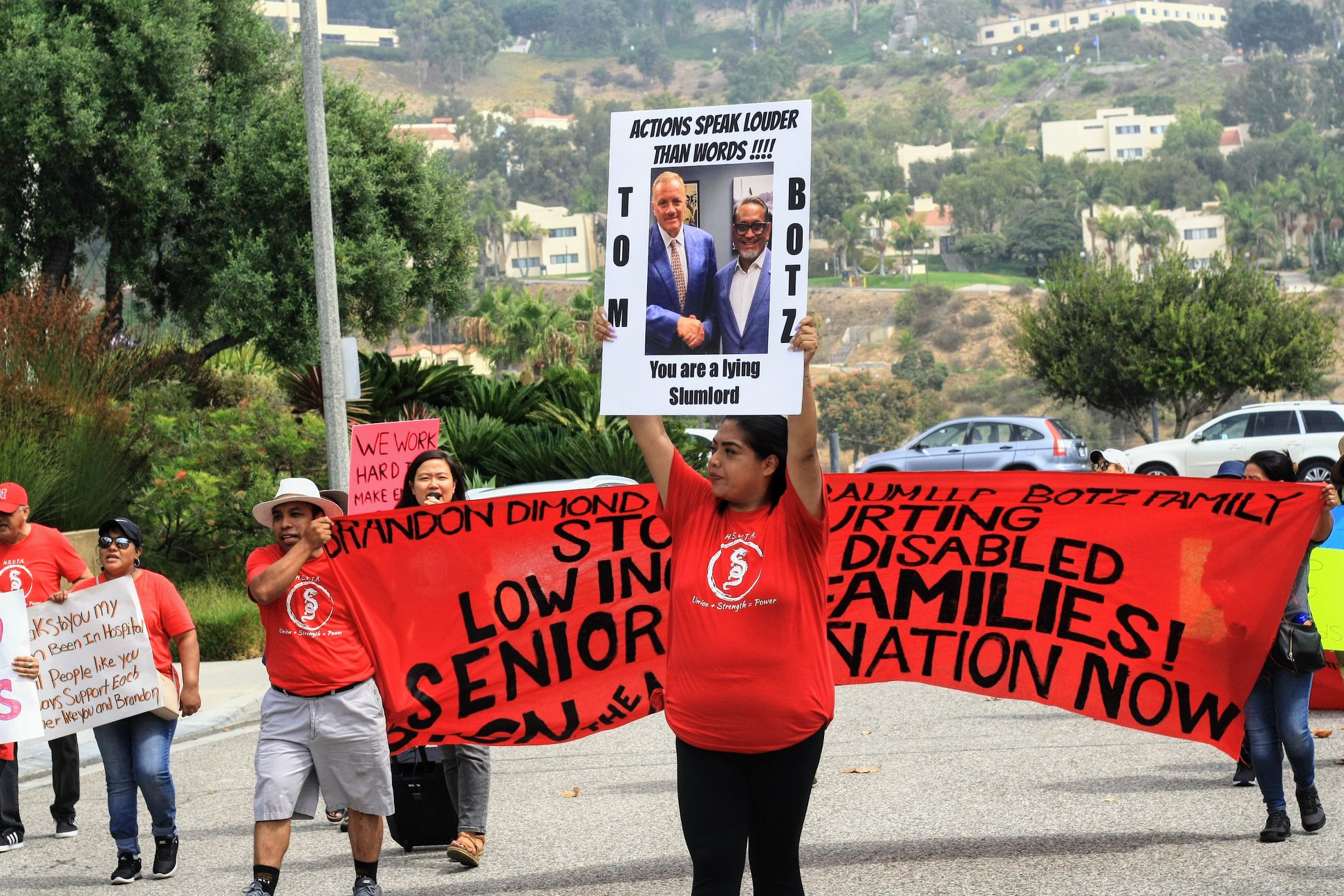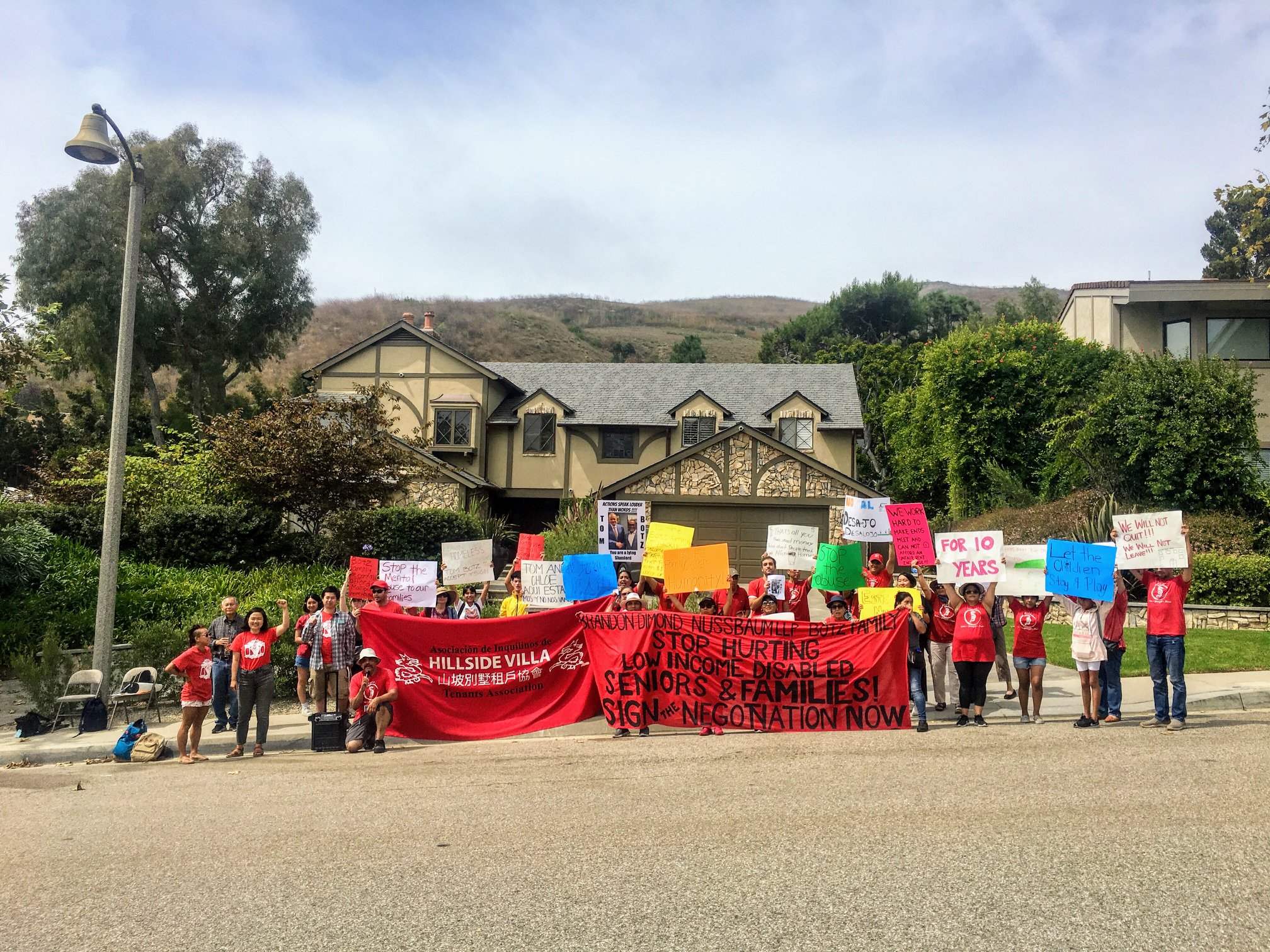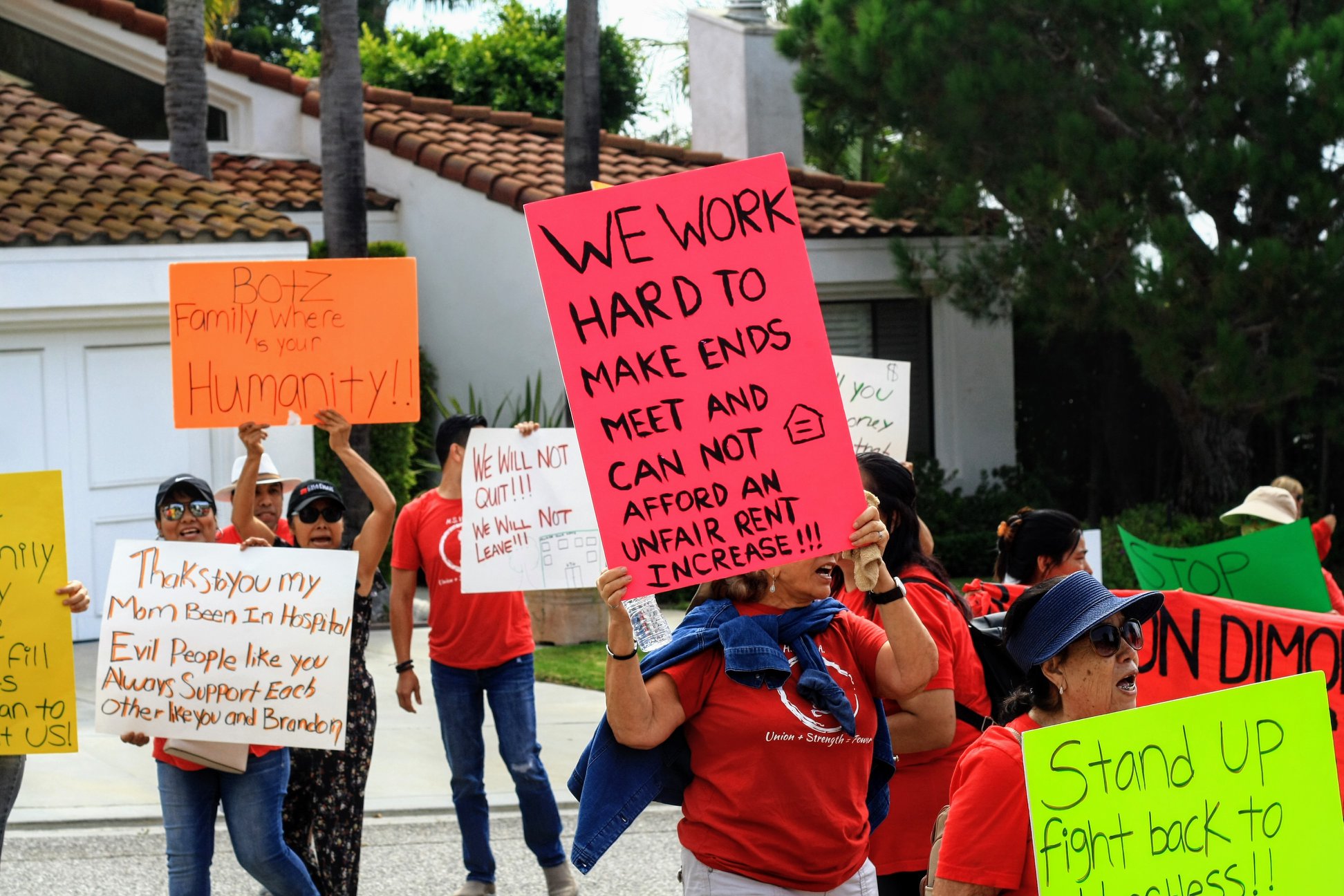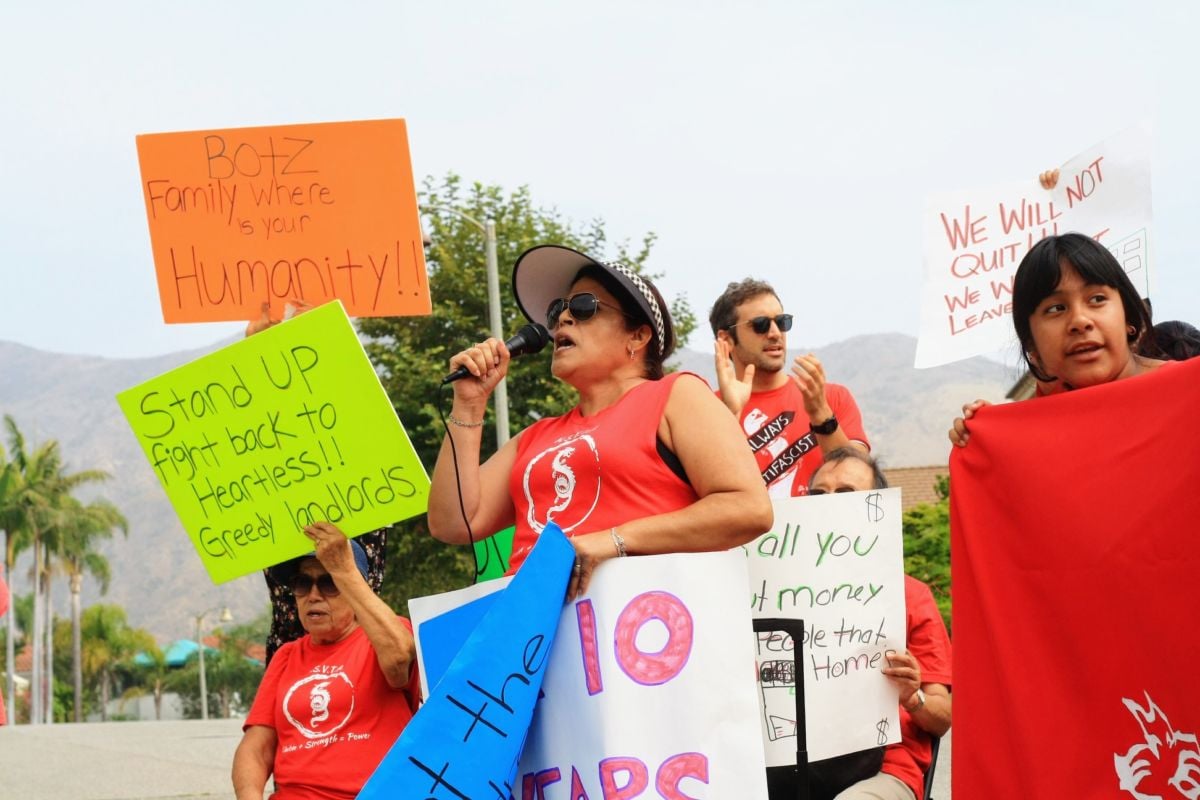After seven months of intense struggle, we in the Hillside Villa Tenants Association thought we had a deal to keep hundreds of people in their homes.
On July 3, Los Angeles City Councilmember Gil Cedillo posted a picture of himself on Facebook shaking hands with Tom Botz, the owner and landlord of the 124-unit Hillside Villa Apartments in Los Angeles’s Chinatown.
“Councilmember Cedillo was able to reach a deal,” his post read, “with the result that not a single resident of Hillside Villa will be displaced or evicted for the next 10 years.” Positive press coverage for Cedillo – and, to a lesser extent, for the Tenants Association – poured in.
But it turns out we haven’t won yet, and the threat of mass eviction remains at this expiring “affordable housing” building. Families that have been living in two- and three-bedroom apartments with rents under or around $1,000 per month at Hillside Villa may be forced to move far away from their rapidly gentrifying community in Chinatown. The median rent for a two-bedroom unit in the 90012 zip code, which contains all of Chinatown and a sliver of downtown Los Angeles, is just under $3,000 per month – completely unaffordable for working-class tenants. Los Angeles County as a whole is slightly more affordable, but the median two-bedroom renting for a little over $2,500 per month is still far out of reach for the vast majority of residents at Hillside Villa.
Botz didn’t actually sign any documents at that July 3 meeting with Cedillo, yet the news from the councilmember was that they had reached a deal in which millions of dollars of public money would be given to Botz in exchange for another decade of restricted rents at Hillside Villa. What exactly happened in that room between Botz and Cedillo is still something of a mystery to us, but it’s clear that the decision whether to accept the deal or not remains in Botz’s hands.

Since then, Botz has issued new 12-month notices, meaning that if this deal isn’t completed, he’ll be able to raise rents as high as he wants come September 1, 2020. He’s trying to squeeze as much money and power as possible out of every aspect of the agreement, and he’s holding hostage the homes of hundreds of people in the process.
Negotiations are ongoing, and we in the Hillside Villa Tenants Association — which includes organizers from both the Los Angeles Tenants Union and Chinatown Community for Equitable Development — are not going to just give up after over 10 months of fighting. We started organizing in January, and were able to delay the first round of massive rent increases, which were to take place on July 1. This was accomplished through a combination of direct-action protests and legal strategies leveraging California’s law which requires advance notice for expiring affordable housing, which Botz appeared to have violated. We then undertook a protracted struggle just to get Councilmember Cedillo to meet with us, eventually putting enough pressure on him to offer up millions of taxpayer dollars to keep the building affordable.
Recently, our actions have focused on pressuring Botz to accept the deal on the table. We’ve chartered buses to demonstrate outside of his mansion in Malibu, and twice have held evening protests in the neighborhood of his lawyer, Brandon Dimond. Though we haven’t yet convinced Botz to seal the deal, an angry and long-winded letter from Dimond to the Legal Aid Foundation attorneys who have been helping us suggests that these actions are effective.
More actions are soon to come.

There is plenty of blame to go around. While Botz has showed where his priorities lie with his willingness to throw hundreds of people out of their homes for the sake of profit, Councilmember Cedillo could’ve done what we originally asked him to do: use eminent domain to purchase the building and keep it permanently affordable.
Eminent domain is a process whereby the city can literally force the landlord to sell the building at market price, as long as it’s then used for a very broadly defined “public purpose.” While it’s most commonly wielded against working-class tenants – see the clearing of LA’s Bunker Hill as a typical urban renewal project that displaced thousands of people – Los Angeles County has recently used eminent domain to buy a vacant lot in South LA for $15.7 million to develop it with retail and affordable housing. Ultimately, though, Cedillo has eschewed this option in favor of a path that still leaves the final decision in Botz’s hands.
Los Angeles City Council has essentially no actual policy for protecting families in the estimated 11,771 affordable housing units that may expire in the city in the next five years, 71 percent of which are “wholly owned by for-profit entities,” according to the LA Housing Department’s own numbers. Based on an average 2.83 people per household in Los Angeles, these affordable housing units house an estimated 33,000 people who will be at risk of possible homelessness if immediate action is not taken. California lawmakers inexplicably went out of their way to exclude these expiring “affordable” developments in Section 4 of a new law, AB 1482, that limits rent increases statewide. We should be very critical of the whole model of privatized “affordable housing” that expires after a number of years.

Still, it’s the very system of private, capitalist land ownership deserves the most blame. This system is fundamentally unjust and anti-democratic, allowing the lives of hundreds of people to be so deeply affected by the decisions of one person — in this case, Botz — just because he has enough money to own the land on which tenants live. We can see how, in practice, private property is dictatorial rule by the rich over the poor: What Botz says goes.
It’s also a cruel way of distributing the things that people need to survive. Approximately 60,000 people in Los Angeles County are unhoused, but instead of allocating land and other resources to mitigate this humanitarian crisis, they will be put toward whatever makes the most money for those who own property. In the language of free-market economists, Botz is encouraged to put hundreds more people on the street; he’s just a “rational and self-interested” owner putting land to its “highest and best use.”
Constant mass displacement, people sleeping on the street and families crowded into slum housing all exist alongside unbelievable wealth and luxury for the rich — that’s the capitalist system working exactly as it’s intended to.
But it doesn’t have to be this way.
At Hillside Villa, this 10-year deal in which Botz remains the landlord represents an immediate solution to keep the families in their homes. But those of us organizing around the issue have had many conversations about what a just and dignified future for this community looks like, and none of them involves Botz or any other profit-seeking landlord owning the building. We know that private, capitalist land ownership is not meant to benefit the residents of Hillside Villa.
There are other ways of relating to the land, as practiced by so many different communities across the world. In fact, titled land owned by individuals or corporations is a relatively recent invention, and has always depended on violent conquest and continuing regimes of terror.
However, we can still imagine a world where land is allocated based on the collective needs of masses of people, not the wants of capitalists like Botz.
Strong, universal rent control can be the first step toward limiting (and ultimately, reversing) land being used for unlimited profit. California’s recent law is a decent reform, but it still allows rent increases of up to around 8 percent per year and excludes tenants in these expiring “affordable housing” buildings who desperately need protections. Furthermore, cities, states or the federal government can do what Hillside Villa demanded and take more and more land off the capitalist market by using eminent domain (currently happening in Berlin).
There’s not a scarcity of housing, land or resources in general; they’re just being hoarded by the rich.
Landowners like Botz currently have way too much power thanks to our capitalistic system. And this isn’t just in Los Angeles; nationwide, there’s not a single state or county where a minimum-wage worker putting in 40 hours per week can afford to rent the average two-bedroom apartment.
We can fight back and demand better, like the Hillside Villa Tenants Association is doing. We can build a movement full of people who are sick and tired of the current system. We can create a society that works for everyone, not just the capitalists. A victory in both our short- and long-term goals at Hillside Villa can provide a model for how to get this done.
Angry, shocked, overwhelmed? Take action: Support independent media.
We’ve borne witness to a chaotic first few months in Trump’s presidency.
Over the last months, each executive order has delivered shock and bewilderment — a core part of a strategy to make the right-wing turn feel inevitable and overwhelming. But, as organizer Sandra Avalos implored us to remember in Truthout last November, “Together, we are more powerful than Trump.”
Indeed, the Trump administration is pushing through executive orders, but — as we’ve reported at Truthout — many are in legal limbo and face court challenges from unions and civil rights groups. Efforts to quash anti-racist teaching and DEI programs are stalled by education faculty, staff, and students refusing to comply. And communities across the country are coming together to raise the alarm on ICE raids, inform neighbors of their civil rights, and protect each other in moving shows of solidarity.
It will be a long fight ahead. And as nonprofit movement media, Truthout plans to be there documenting and uplifting resistance.
As we undertake this life-sustaining work, we appeal for your support. Please, if you find value in what we do, join our community of sustainers by making a monthly or one-time gift.
